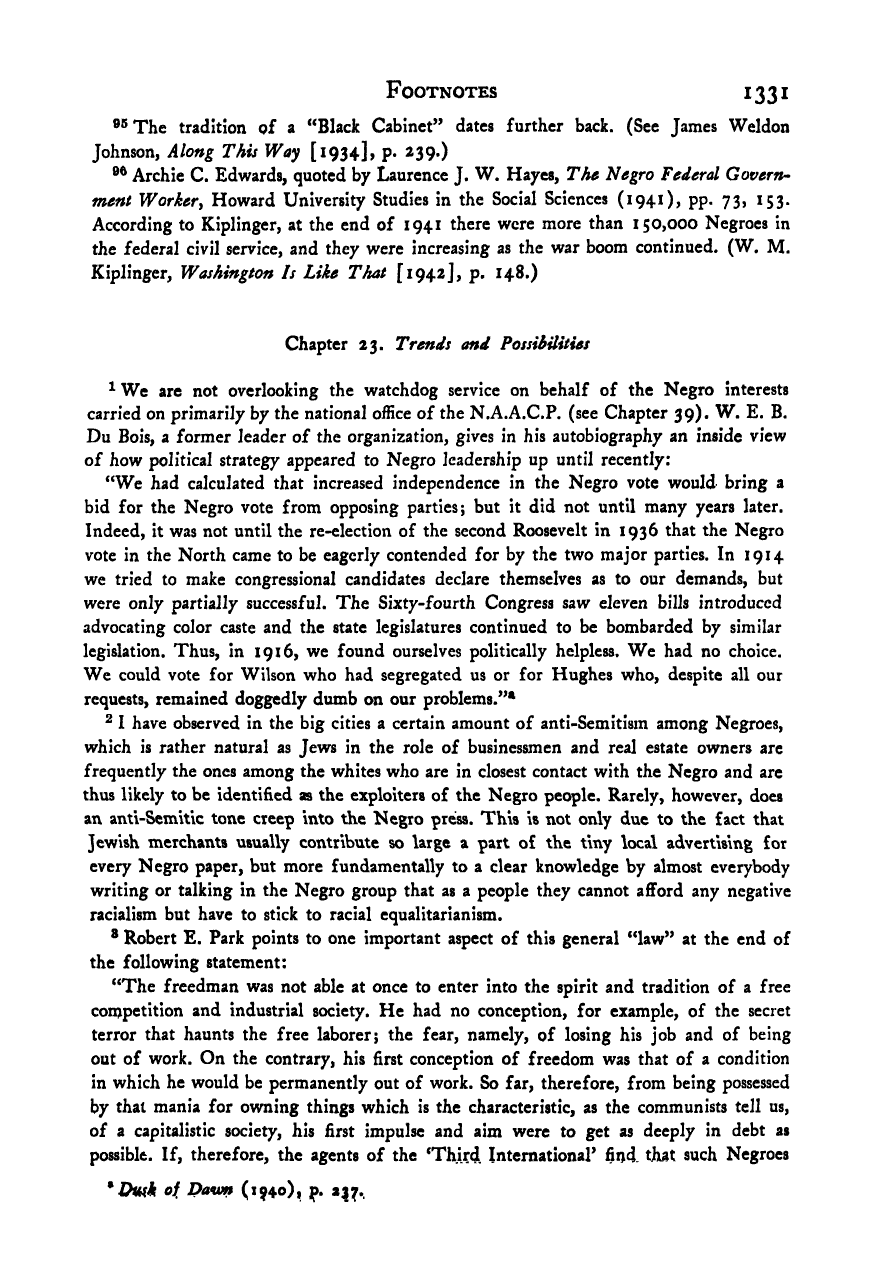Note: Gunnar Myrdal died in 1987, less than 70 years ago. Therefore, this work is protected by copyright, restricting your legal rights to reproduce it. However, you are welcome to view it on screen, as you do now. Read more about copyright.
Full resolution (TIFF) - On this page / på denna sida - Footnotes - Chapter 22 - Chapter 23

<< prev. page << föreg. sida << >> nästa sida >> next page >>
Below is the raw OCR text
from the above scanned image.
Do you see an error? Proofread the page now!
Här nedan syns maskintolkade texten från faksimilbilden ovan.
Ser du något fel? Korrekturläs sidan nu!
This page has never been proofread. / Denna sida har aldrig korrekturlästs.
Footnotes 1331
®®The tradition of a “Black Cabinet” dates further back. (See James Weldon
Johnson, Along This Way [i934]> p« 239*)
Archie C. Edwards, quoted by Laurence J. W. Hayes, Tha Negro Federal Govern^
ment Worker^
Howard University Studies in the Social Sciences (1941), pp. 73, 153.
According to Kiplinger, at the end of 1941 there were more than 150,000 Negroes in
the federal civil service, and they were increasing as the war boom continued. (W. M.
Kiplinger, Washington Is Like That [1942], p. 148.)
Chapter 23. Trends and Possibilities
^
We are not overlooking the watchdog service on behalf of the Negro interests
carried on primarily by the national office of the N.A.A.C.P. (see Chapter 39). W. E. B.
Du Bois, a former leader of the organization, gives in his autobiography an inside view
of how political strategy appeared to Negro leadership up until recently:
“We had calculated that increased independence in the Negro vote would bring a
bid for the Negro vote from opposing parties; but it did not until many years later.
Indeed, it was not until the re-election of the second Roosevelt in 1936 that the Negro
vote in the North came to be eagerly contended for by the two major parties. In 1914
we tried to make congressional candidates declare themselves as to our demands, but
were only partially successful. The Sixty-fourth Congress saw eleven bills introduced
advocating color caste and the state legislatures continued to be bombarded by similar
legislation. Thus, in 1916, we found ourselves politically helpless. We had no choice.
We could vote for Wilson who had segregated us or for Hughes who, despite all our
requests, remained doggedly dumb on our problems.”*
^ I have observed in the big cities a certain amount of anti-Semitism among Negroes,
which is rather natural as Jews in the role of businessmen and real estate owners are
frequently the ones among the whites who are in closest contact with the Negro and are
thus likely to be identified aes the exploiters of the Negro people. Rarely, however, does
an anti-Semitic tone creep Into the Negro press. This Is not only due to the fact that
Jewish merchants usually contribute so large a part of the tiny local advertising for
every Negro paper, but more fundamentally to a clear knowledge by almost everybody
writing or talking in the Negro group that as a people they cannot afford any negative
racialism but have to stick to racial equalitarianism.
® Robert E. Park points to one important aspect of this general “law” at the end of
the following statement:
“The freedman was not able at once to enter into the spirit and tradition of a free
con^petition and industrial society. He had no conception, for example, of the secret
terror that haunts the free laborer; the fear, namely, of losing his job and of being
out of work. On the contrary, his first conception of freedom was that of a condition
in which he would be permanently out of work. So far, therefore, from being possessed
by that mania for owning things which is the characteristic, as the communists tell us,
of a capitalistic society, his first impulse and aim were to get as deeply in debt as
possible. If, therefore, the agents of the ‘Third International’ find, that such Negroes
*Dush of Dawn (1940), p. 117.
<< prev. page << föreg. sida << >> nästa sida >> next page >>